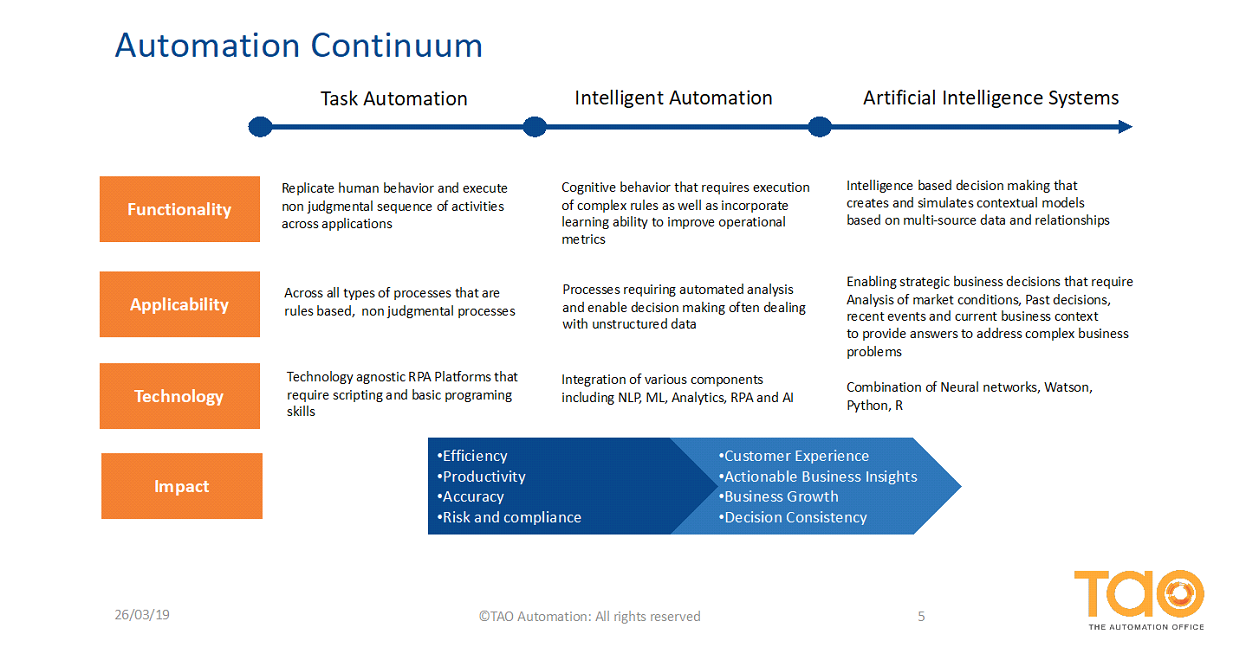It’s about the Business Process, not about the Technology.
RPA and attendant technologies that automate business processes at scale are now very mainstream.
As organizations get familiar and comfortable with implementing RPA to automate certain tasks within larger processes, they are also realizing that in order to meaningfully transform a business process, they need to explore the possibilities offered by Intelligent Automation technologies.
The reason for this is fairly clear. Automation is seen as a means of driving the digital transformation agenda of a business. While the rapid and immediate gains from RPA are now being realized at scale, unless entire business processes are significantly transformed, the digitalization agenda is only partly fulfilled. If the goal is to redefine customer and stakeholder experience into new paradigms, enterprises need to understand how to use automation and cutting-edge analytics to deliver these.
TAO’s view of the automation continuum places Intelligent Automation as the mid-way point between basic task automation using RPA and full-fledged Artificial Intelligence systems. While technologies for the latter are still developing into commercial scale, IA, or Intelligent Automation is here and ready for deployment at commercial scale.

Various organizations are at different stages of automation and as such, are not making a distinction between RPA and IA. In fact, our experience is that a focus on the business outcomes must remain key rather than a focus on technology.
For some organizations, it is about merging thought process and relevant transformation strategy around defining a road map on how front-end products and processes map to back-end products/processes. For others, it is about improving decision making in the lines of business to bring in efficiency.
Creation of Cognitive systems and thereby creating in-built analytics to better enable the business to create newer products and go-to-market models is something each organization aligns with.
Redeploying personnel to perform higher-value work and thus create a team who are closer to the business on the ground rather than performing mundane, back-end operational processes is another common factor that is seen across all industries and functions.
In the instance of a global retail major, an Intelligent Automation project was taken up for optimization of the sales channel – wherein the company wished to focus on enhancing their relationship with small traders or corner grocery stores. An IA system was strategized and executed to provide the sales team with specific guidelines such as which stores were stocked out of which products, which were the products that they had purchased and which were the high margin products for a particular store that the sales team should focus on.
For many enterprises, IA is about a learning curve – “virtual learning by doing”.
Whatever technologies are required to automate a process effectively and efficiently must be deployed. A business decision must be made rather than a technology decision.
Very often, in-built analytics is key to several process automation projects. In such cases, IA plays a definitive role. Another area where we see IA playing an important role is customer service and customer experience, where large scale analytics and self-learning systems are key.
Every time there is a need to work with large volumes of unstructured data, IA becomes and immediate consideration.
TAO’s view is that Intelligent automation is a more advanced form of what is commonly known as robotic process automation (RPA). It is a far more strategic theme. IA is about automating a process vs. automating a task.
It is essentially a software that mimics the behaviour of an end-user by using existing enterprise application screens or web pages to find, evaluate, cut, calculate, transform and enter data into existing, enterprise application fields according to business rules. This technology is ideal for many business processes, particularly those that are labor-intensive.
Any large-scale activities or groups of repetitive tasks that draw on or feed information to multiple systems is an intelligent automation candidate. Because of its transformative nature, intelligent automation gives businesses a competitive advantage through lower-cost scalability, nimbleness by redeploying personnel to higher-value work and an enhanced, customer-friendly brand image.
To sum it up – Due to Intelligent Automation’s transformative nature, intelligent automation gives organizations & their business a competitive advantage through enhancing customer experience, thereby enhancing brand value, lowering costs and providing nimbleness by redeploying personnel to higher-value work.
Download

